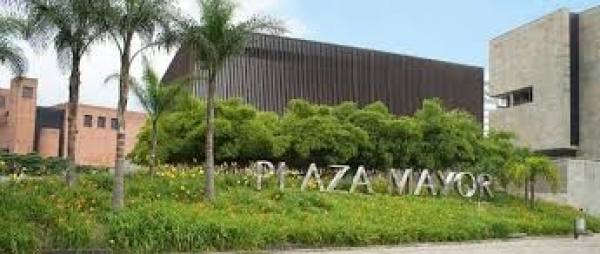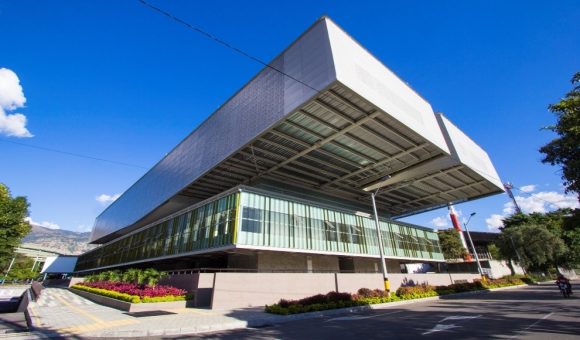Medellin’s Business Tourism Sector goes under Microscope in New Study

A new study published by Medellin’s “Ruta N” technology innovation center analyzes trends, opportunities and areas for improvement for Medellin’s booming business-conference tourism sector.
The study tapped experts from University of Medellin, the Medellin Chamber of Commerce (CCM) business-tourism cluster, the Medellin Convention and Visitors Bureau (MCVB), local high-tech companies including Tecnnova and Comunicaciones Efectivas, and the MCI Group, a global meetings-management consulting organization.
In a presentation to the recent Expo Eventos conference at Medellin’s Plaza Mayor convention center, University of Medellin researcher Alexander Zuñiga outlined some key lessons from the study.
Among the lessons: Congresses and conventions around the globe are growing in variety and total numbers. But most individual conferences/conventions are getting smaller in size and shorter in duration.
Hence Medellin needs to focus more of its efforts on expanding certain infrastructures for smaller, economically attractive conferences, as well as attracting and organizing such events.
Hotels with suitable conference centers have now become the overwhelmingly dominant sites for conferences around the world, the Ruta N study shows.
The typical city-owned convention centers around the world are still seeing their event numbers grow, but at a much slower pace than the hotel-based conferences, according to the study.
Around the world, the average duration of a congress or convention has dropped to 3.8 days, compared to 6.3 days in the decade of the 1960s, the study also found.
Events focused upon the medical/health sectors, as well as high-tech sectors, can be especially lucrative.
Among the reasons: Doctors and high-tech professionals tend to have relatively high incomes and travel to five-star hotels for their congresses and conventions, Zuñiga pointed out in his presentation.
In addition, relatively deep-pockets medical-technology and pharmaceutical companies (as well as other types of technology companies) tend to sponsor such events, making such events even more profitable for event organizers and conference hosts.
Around the globe, medical/health conferences tend to peak in numbers in April-May, as well as September-October, the Ruta N study shows. But in Colombia, such congresses tend to peak in August, although the March-to-May period as well as October come in as next-most-favored months for such conferences, the study shows.
Colombia has become one of the top-30 global destinations for conventions, with medicine and health accounting for 17% of total events, followed by technology, with 14% of the events, the study shows.
While hotels now get 44% of the global convention business, universities have seen their share of the conference business grow to 22% in recent years, almost matching the 24% global share of traditional city convention centers, the study shows.
As for Medellin, medical/health conferences are now the most numerous events, taking a 17% share, followed by the technology-information-communications (TIC) sector at 14% share, the study shows. The industrial textile, construction and energy sectors account for 6.8% of Medellin’s total events, the study found.
Opportunities
The Ruta N study found that while Medellin can boast of a booming conference and event business, the city needs to focus even more efforts on attracting events involving groups of 50 to 500 attendees – especially those industry groups with relatively strong economic power (such as medicine and high-tech) as well as groups with favorable, global recognition.
For Medellin, this means developing and attracting more events around its six strategic clusters including medicine, textiles/fashion, energy, construction, TIC and the emerging “insider” events such as the first-ever Expo Eventos congress held in July 2015 at Plaza Mayor.
The 2015 version of Expo Eventos not only included educational workshops for companies in the burgeoning events-services sector in Medellin (and elsewhere in Colombia), but also a trade-floor company showcase. A listing of such service companies, complied by Medellin-based Prisma (a principal organizer of Expo Eventos), is now available at: www.directorioproveedoresdeeventos.com .
Profitable congresses or conferences that can become annual events in Medellin should get special attention and effort, while promoters should be careful of putting too-much emphasis on showy but one-off events that might not deliver much net economic return for the city and the event organizers, the Ruta N study found.
Other categories of events for which Medellin likely could benefit include conferences on marketing, leadership, management, business and economics, according to the study.
Challenges
While Medellin has several venues with infrastructure and technology suitable for relatively smaller conferences (50 to 500 participants), the city needs more such spaces, according to the study.
According to the study, Medellin has a total of some 115 sites that conceivably could be used for such conferences. But not all of them meet technical, mobility or size requirements — especially for the small-to-medium-size groups.
On the other hand, Medellin can offer international conference attendees a relatively robust and growing hotel sector (especially in the higher-class ranges) at competitive prices, the study found.
Five hotels stand-out for having attractive and appropriate infrastructure for the targeted conference groups of 50 to 500, including Hotel Intercontinental, Hotel Dann, Hotel San Fernando Plaza, Hotel Tryp and Hotel Estelar Milla de Oro, according to the study.
Another challenge facing Medellin’s hoped-for expansion of its international conference-business is a relatively small number of service companies that offer suitable interpretation and translation services, according to the study.
The Prisma service-company guide for example lists 14 local companies offering interpreter and translation services for international visitors to Medellin.
Similarly, the recent “Big Data 2015” conference — organized by Medellin-based Setup Academy and cosponsored by Comfenalco, CCM, Universidad Nacional, Universidad Pontificia Bolivariana and several high-tech companies — featured simultaneous Spanish-to-English translations (personally monitored by Medellin Herald.)
Two translators from Medellin-based TraduTecnicas (www.tradutecnicas.com) provided the simultaneous translations at Big Data 2015. Yet (oddly enough) TraduTecnicas doesn’t appear among the companies in the 2015 edition of the Prisma services guide.
















